Why Finland is the Happiest Country in the World | Top Reasons
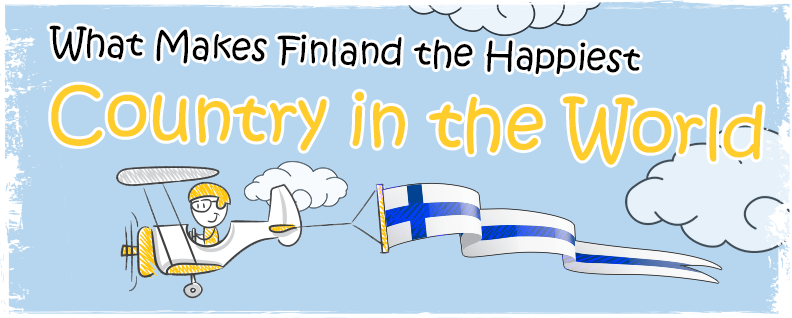
What Makes Finland the Happiest Country in the World
When people imagine the happiest place on Earth, what usually springs to mind is some tropical beach on an island somewhere. Rarely do people imagine the frozen marshlands of Finland and the sub-zero temperatures. Yet, despite the terrible weather, Finland has achieved first place on the World Happiness Report for the sixth year in a row.
So how have the Finns done this? What happiness could there be in a land where the sun doesn’t shine often, and the winters are long and difficult? Though it may not be obvious at first, running a country in the snowy wastes of Northern Europe is a complicated endeavour. Therefore, we have many different factors to look at, from the more mundane aspects, such as politics and the welfare system, to more exciting ones, such as the economy and other miscellaneous issues.
With this in mind, we will take a closer look at Finnish happiness, what contributes to it, and what good practices we can steal to apply in our respective countries.
Finnish Welfare and Social Systems
Northern Europe is quite famous for its implementation of free-market economics with robust welfare systems. This gives rise to advanced economies paired with a major focus on societal safety nets and increased quality of life. Let’s take a look at the Finnish version.
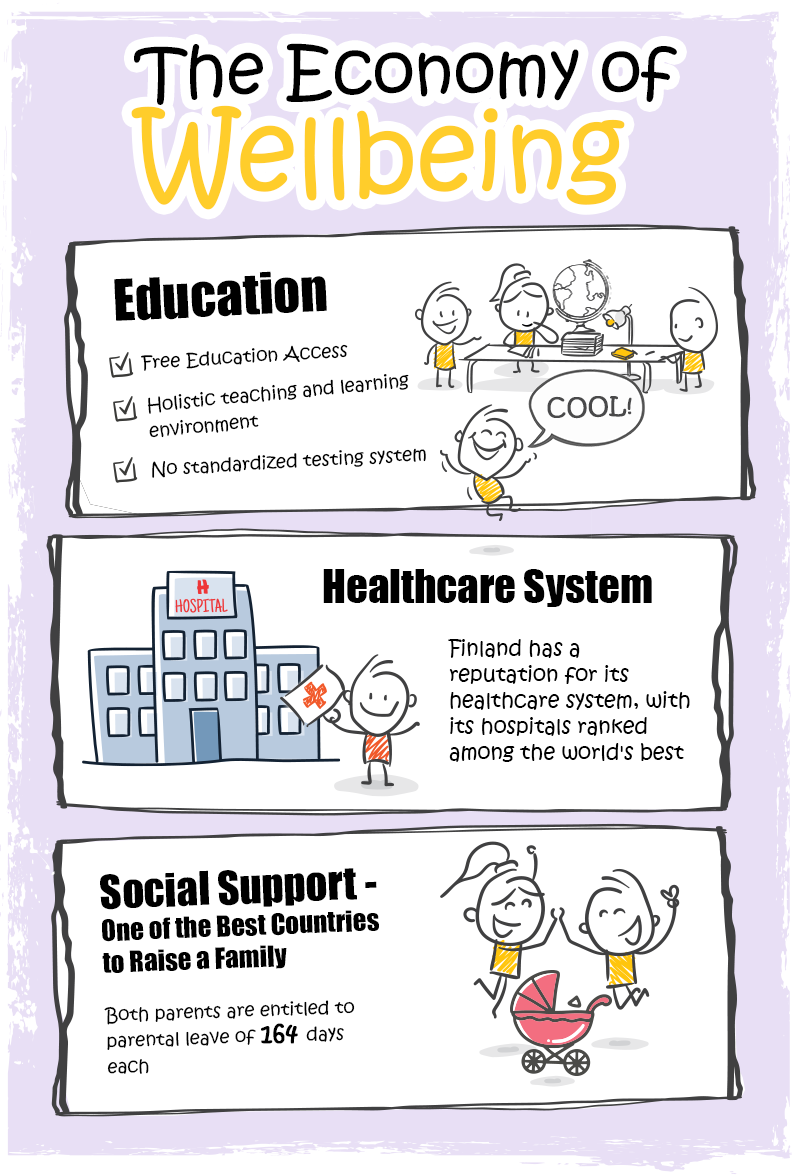
Education Pioneer
The Finnish education system is well-known in the West and stands out as being more intuitive and efficient. Finnish students have consistently shown better results than their European counterparts, despite studying fewer hours and being tested less frequently.
The Finnish approach to education is quite modern and does away with certain preconceptions about schooling. For one, teachers are given more leeway with how they teach the material and are not bound by a set curriculum. This allows educators to develop their own individual style, suited to the individual case of each classroom.
Comprehensive Healthcare System
We all know that health is important to our overall well-being, and the Finns do, as well. This is why they have put in considerable effort to create one of the best functioning healthcare systems in the world. Turns out that when your population is not suffering from debilitating and preventable illnesses, they tend to be quite happy.
In 2021, the country ranked 12th on the quality of healthcare index. The Finnish system consistently delivers efficient and effective care at a low cost. Funded by taxpayers, it is available to all residents at the point of service. What’s more, the Finns are also keen on implementing many cutting-edge technologies to assist doctors, leading to better outcomes.
Social Support – One of the Best Countries to Become a Parent
Of course, quality-of-life government services don’t end with schooling or healthcare. New Finnish parents are also provided extensive support. The so-called ‘baby box’ is granted to every new mother, and it holds just about everything you need to raise a kid for the first year. Clothes, toys, and a whole bunch of other goodies significantly help ease the stress of having a child. Right now, Finland boasts the lowest child mortality rate in the world, in part thanks to initiatives like this and the excellent healthcare system mentioned previously.
Parental leave is also readily available to both parents. Each person is afforded 164 days of leave for every child. Furthermore, the system is flexible, allowing individuals to transfer some of their own leave to their partner. Single parents, on the other hand, receive double the standard days to make up for the difficulties.
Government, Politics, & Economics
No society can be happy without a rigid and stable political structure. While politics are rarely associated with anything positive, the art of statecraft is essential for establishing prosperity. Here are some facts about the Finnish political and economic systems.
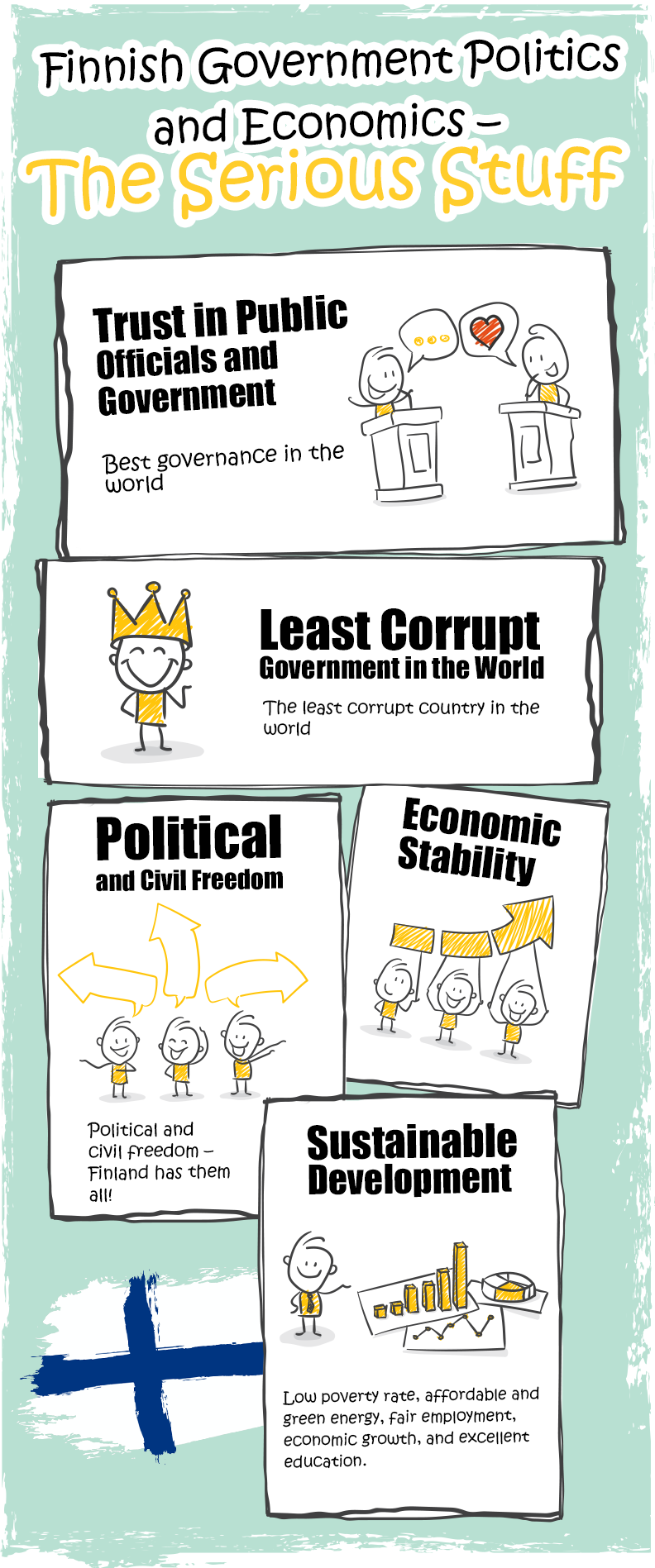
Public Officials and Government
Trust in the government and its institutions is difficult for any country to accomplish, but the Finns have managed to come out okay. In fact, a majority of the population reports a positive outlook on their elected officials. Imagine what that must feel like.
Finland shows many features of a functioning and stable democracy. Voter turnout is fairly high with each election, and the system looks to be working as intended. The representation of women in politics is also on point, and the election of Sanna Marin as Prime Minister in 2019 strengthens this argument.
The Least Corrupt Government in the World
Something that is almost alien and bizarre to many people around the world is the level of corruption in Finland or rather the lack of it. Finland currently holds the enviable position as the least corrupted country in the world, beating many European states by a significant margin. This makes the trust of Finns in their political institutions much more understandable since it is reasonable for them to vote and receive the desired results.
Political and Civil Freedom
To be a functioning democracy requires several conditions, some of them being free expression and the freedom to organise politically. These are almost a given in Finnish society, and the country earns excellent marks in this regard. Civic freedoms are guaranteed for every individual, including marginalised groups of many varieties. Arguably, the rule of law is applied in Finland better than in most countries out there.
Economic Stability
Naturally, politics and the economy go hand in hand. Given the robust political system and low levels of corruption in Finland, one can reasonably expect the economy to be in great shape. That is exactly so.
The Finnish economy has proven exceptionally resilient and well-adjusted. It ranks as the 9th freest economy in the world for 2022, which makes it great for doing business. This makes sense, considering that this is the country where Nokia started and flourished. Regular people also benefit from this, as poverty is quite low, and the country beats the EU average on many metrics.
Sustainable Development
As far as sustainable development goes, Finland is also found at the top of the rankings. Beating Nordic countries, such as Denmark, Sweden, and Norway, Finland has been increasing the quality of life of its population for decades.
The Sustainable Development Report shows that Finland is advancing well in most significant metrics. Whether it be sustainable energy practices, working conditions, or economic development, Finns look to have a bright future ahead of them.
Finnish National Psyche
Politics and the economy might be important, but a positive attitude goes a long way. The Finns have some ideas about that too, it seems. So, let’s take a look at Finnish notions about life and other things.
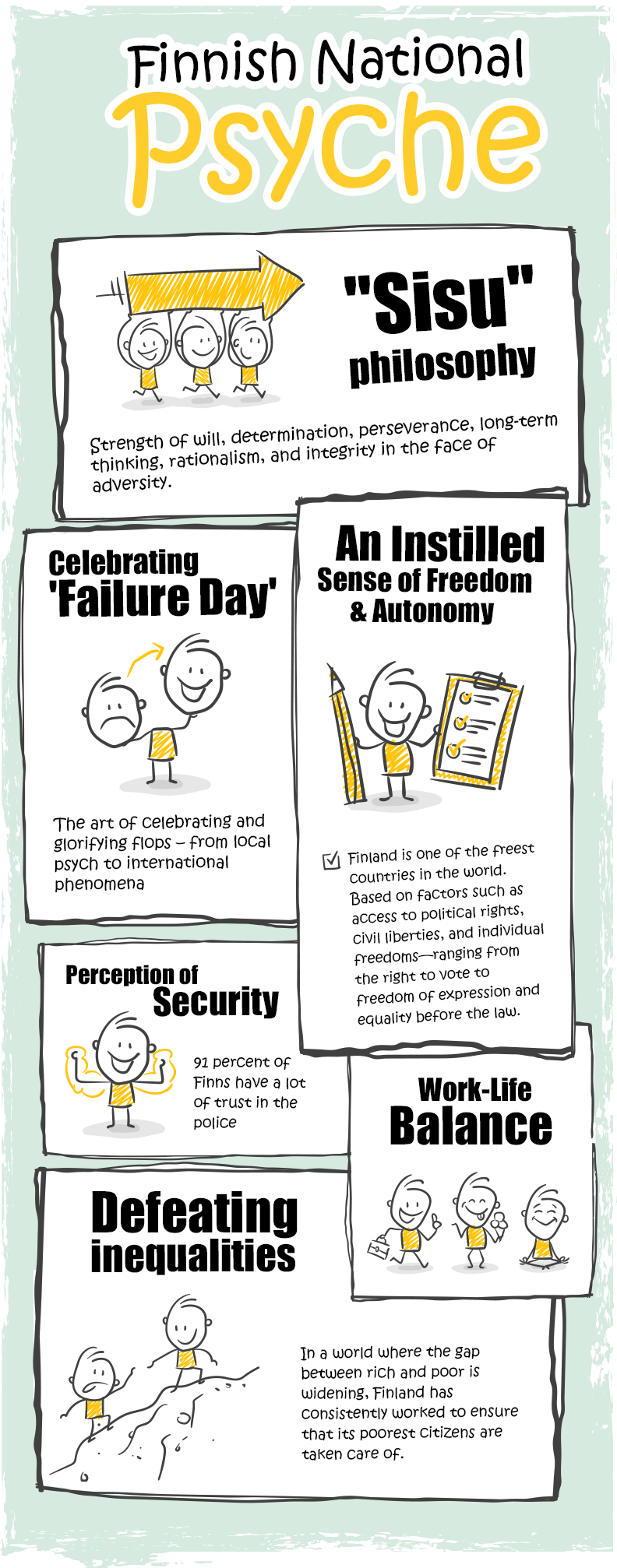
Be True to “Sisu”
The Finnish concept of ‘sisu’ is something often attributed to the success of the nation. There is no direct equivalent for ‘sisu’ in English. It is easy to think about it as a type of Finnish stoicism that drives you to endure difficulties and press on. Supposedly, this attitude comes in handy when you’re living in below-freezing temperatures for a good part of the year. Of course, it does wonders for Finnish prosperity and development.
While ‘sisu’ is not a codified philosophy as others are, it has definitely been a distinct characteristic of the nation. Historically, the Finns have not been in the most enviable situation, but with grim determination, they have managed to overcome many challenges.
Celebrating ‘Failure Day’
The Finnish Failure Day is an interesting idea and a relatively new one at that. The brainchild of university students, Failure Day is held annually on October 13. As mentioned previously, the Finnish concept of ‘sisu’ compels people to act in the face of hardship and stipulates that failure is not an option.
But not making any mistakes is unrealistic and puts a lot of pressure on individuals to be perfectionists. Failure Day was designed for people to share their experiences of failing to relieve that stress and to show others that the path to success is riddled with setbacks and blunders.
By celebrating Failure Day, Finns try to encourage each other to begin something new and difficult rather than to be petrified by the fear of failure. Many major Finnish corporations and public figures have expressed support for Failure Day, and it has been going strong since 2010.
An Instilled Sense of Freedom & Autonomy
The political and civil freedoms mentioned above contribute to a sense of general liberty and guaranteed autonomy for the individual. It’s a difficult thing to accomplish even for the most developed societies out there. Yet, Finns are able to go about their lives, knowing that they are some of the freest people in the world.
You will be hard-pressed to find a statistic that does not feature Finland among the top five countries in terms of personal freedom. It’s, therefore, perfectly reasonable to assume that this sense of liberty affords the average Finn more options in life than they would have without it.
Perception of Security
Ben Franklin is often misquoted as having said: ‘Those who give up liberty for security deserve neither’. Well, those who continue to spread this misrepresented idea rarely consider that you don’t need to sacrifice one for the other when you can have both. Finland is a great example of this.
Despite having excellent personal freedom, Finland also boasts one of the safest societies in the world, just behind Denmark and Norway. The rule of law is a fact of life here, and it is respected by all government institutions. Moreover, 91% of Finns report that they trust the police to perform their job as intended. With functioning institutions and political accountability, you can have all the freedoms you want, as well as the security to enjoy them.
Work-Life Balance
How can you be happy in life if you spend all of your days working? The answer is a good work-life balance, paying attention to both while neglecting neither. Finnish workers have earned many rights to achieve just this. Yearly paid leave and national holidays are codified into the labour laws, affording each worker a minimum number of days per year to enjoy at their leisure.
The work culture is also quite worker-friendly. The Finns pride themselves on creating an enjoyable and relaxed work environment. Overformality is rarely seen in Finnish companies, and the so-called flat hierarchies allow workers to freely communicate their needs and wants with their superiors. Furthermore, personal life is respected in this country, and you can expect full privacy outside of work.
Fight Against Inequality
Northern Europe is well-known for its proactive approach to reducing inequality, and Finland is no exception to this. While no perfect egalitarian society exists, Finland is not bad by any measure. In fact, it’s an excellent place to live, even if you’re not in the top 1%.
The excellent social welfare systems afford individuals a safety net if they fall on hard times. Moreover, the intuitive education process serves as an excellent opportunity for upward mobility. Any Finn is guaranteed a high-school education, and they can go to university if they wish. This creates a system where even if you’re at the bottom of the societal hierarchy, you have a decent chance to live a successful life.
Of course, that is not to say that there is no inequality in Finland. It’s not some post-capitalist paradise, after all. There has been a steady increase in the earnings gap between the top rich and the middle and working class. Moreover, gender equality still leaves something to be desired in terms of outcomes. Yet despite all that, Finland is taking the necessary precautions to provide its citizens with the opportunities to close the gaps.
Other Keys to Unlocking Happiness
Daily life also plays a significant role in the happiness of Finns. There are multiple Finnish hallmarks that have caused the country’s popularity to soar, and below, we will take a closer look at some of them.
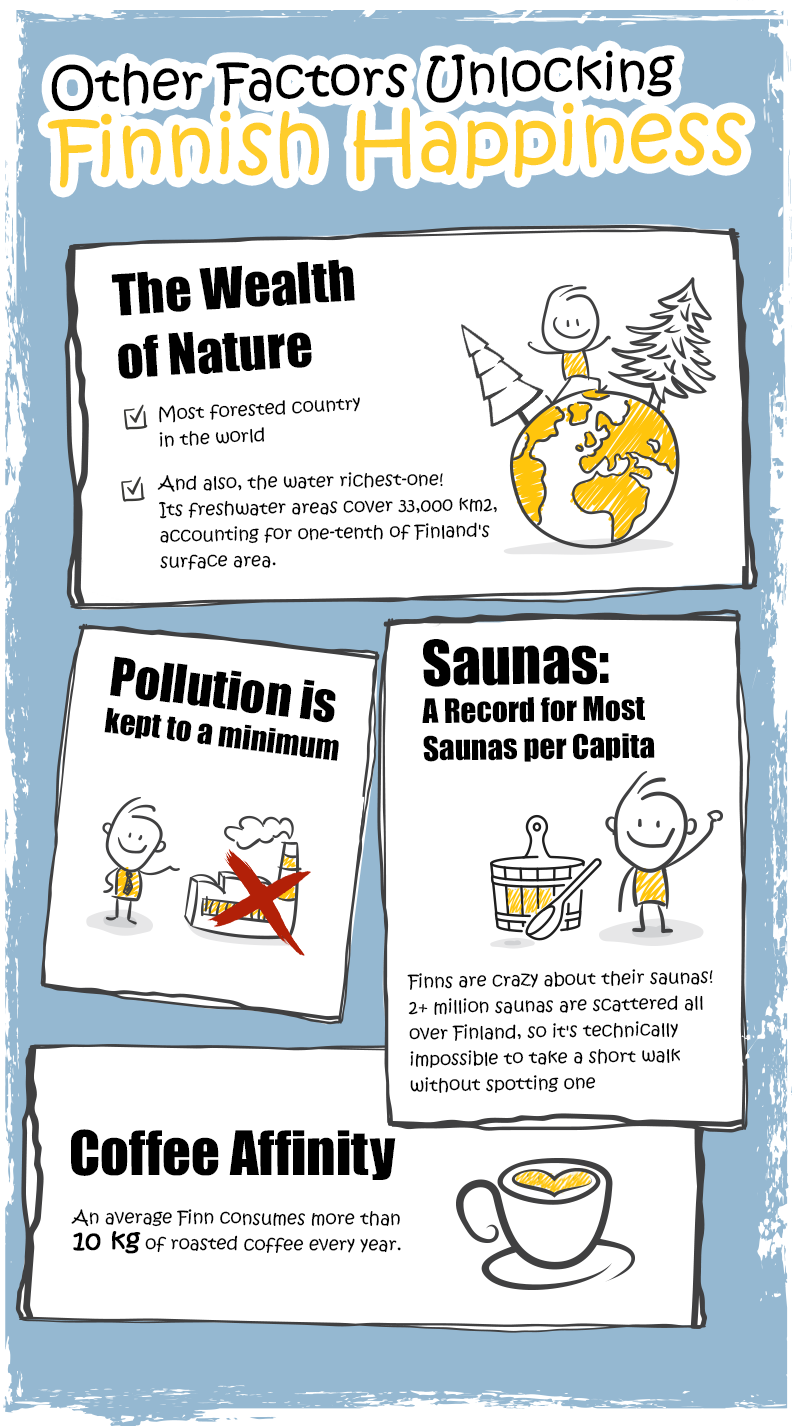
Nature
There are many different pathways to happiness, and many prefer to find it in the outdoors. Spending time with nature, away from the hustle and bustle of big cities, is an avid pastime for many Finns. And they certainly have many options available in this regard. Finland is covered in dense forests, mountains, and lakes. In fact, this is the most forested country in the world. More than 75% of Finland is covered in forests ready to be explored.
Low Pollution Levels
When it comes to pollution and cleanliness, few countries out there can beat Finland. The dense and extensive forests surely contribute much to this. In the latest index, Finland was ranked as having the cleanest air in the world. Moreover, the government is actively implementing more green energy to bring pollution levels down further. Many forested areas have also been declared off-limits for exploitation to conserve Finland’s natural landscape and keep things nice and green.
Saunas: A Record for Most Saunas per Capita
What most people think when they hear about Finland is usually saunas. In fact, the word ‘sauna’ is of Finnish origin, to the surprise of no one. The Finns love their saunas so much, that they built more than two million of them. They are absolutely everywhere, and you probably can’t walk for more than a few minutes without coming across one. It makes sense that living in a half-frozen country would incentivise people to seek out the hottest locations.
Coffee Affinity: Finns are Among the Biggest Coffee Drinkers in the World
Many people associate happiness with a warm cup of coffee. Whether to satisfy a crippling caffeine addiction or simply to get a pick-me-up, reaching for a warm mug has become instinctive for a large majority of the population. Nowhere is this more prevalent than in Finland. The country ranks as a top consumer of coffee per capita. Specifically, the average Finn consumes more than 10 kg of roasted coffee every year.
Conclusion
All in all, there are many different aspects that factor into the happiness of Finns, and we can only cover so much. The information above should be enough to provide some glimpse into the world of Northern Europe and to explain how the people managed to create a world-class civilisation in an inhospitable land. Ultimately, happiness is not a metric that can be measured with any degree of accuracy. So, we encourage everyone to find what works for them, whether following the Finnish model or another way.
Fair Use Feel free to use any and all information available on this page, provided you link to this article as your source.